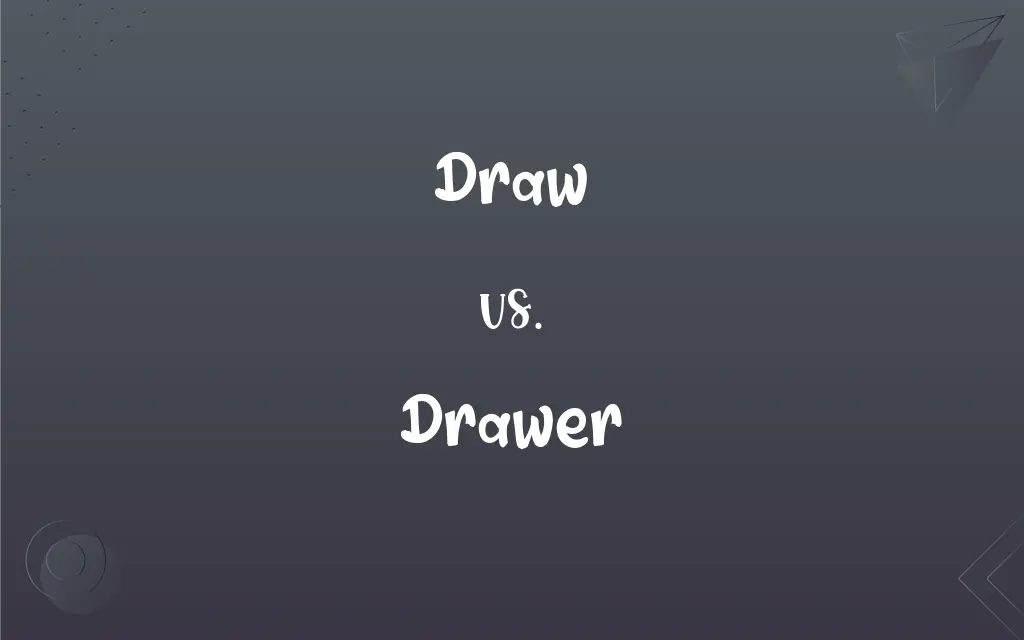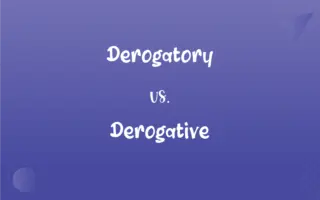Draw vs. Drawer: What's the Difference?
Edited by Aimie Carlson || By Harlon Moss || Updated on November 10, 2023
"Draw" is a verb meaning to produce a picture or pull something towards oneself, while "drawer" is a noun referring to a box-shaped storage compartment.

Key Differences
Draw primarily functions as a verb, often used to describe the act of creating a picture or diagram with a pen, pencil, or similar tool. Drawer, on the other hand, is a noun referring to a part of furniture, typically a sliding box, used for storing items. These definitions highlight their distinct grammatical roles and applications.
In addition to artistic creation, draw can signify attracting attention or pulling something towards oneself, demonstrating its diverse usage in language. Drawer, in contrast, is strictly a physical object, commonly found in desks, cabinets, or dressers, emphasizing its singular, concrete meaning.
Draw also has applications in sports and games, where it can mean to end a game with equal points for each side, or select something randomly, such as in a lottery. Drawer lacks such diverse meanings, remaining confined to its role as a component of furniture.
The etymology of draw traces back to Old English "dragan," meaning to drag or pull, reflecting its varied meanings in modern usage. Drawer originates from the verb "draw," in the sense of pulling out a sliding container, indicating its more specific and limited use.
In a metaphorical sense, draw can be used to describe evoking an emotion or response, like drawing interest or drawing criticism. Drawer does not have such metaphorical uses, being tied to its physical, utilitarian function.
ADVERTISEMENT
Comparison Chart
Part of Speech
Verb
Noun
Primary Meaning
To produce a picture or pull towards oneself
Box-shaped storage component in furniture
Usage Diversity
Wide range (artistic, attracting, ending in a tie, etc.)
Singular (storage)
Etymology
From Old English "dragan" (to drag or pull)
Derived from "draw", referring to the action of pulling out
Metaphorical Usage
Yes (drawing attention, interest, etc.)
No
ADVERTISEMENT
Draw and Drawer Definitions
Draw
To pull towards oneself.
She drew the curtain aside.
Drawer
A sliding storage box in furniture.
She put her clothes in the top drawer.
Draw
To attract attention or interest.
His speech drew a large audience.
Drawer
Part of a desk for keeping items.
He found the keys in his desk drawer.
Draw
To select randomly.
They will draw the winner's name tonight.
Drawer
A component in a dresser for clothes.
The socks are in the bottom drawer.
Draw
To create a picture.
He loves to draw landscapes.
Drawer
A retractable storage unit in kitchen units.
The utensils are kept in the kitchen drawer.
Draw
To end a game with equal points.
The match ended in a draw.
Drawer
A pull-out compartment in a cabinet.
She organized her jewelry in the small drawer.
Draw
To cause to move after or toward one by applying continuous force; drag
Drew the chair closer to the table.
A team of horses drawing a wagon.
Drawer
One that draws, especially one that draws an order for the payment of money.
Draw
To cause to move in a given direction or to a given position, as by leading
The teacher drew the children into the room to see the decorations.
Drawer
(also drôr) A boxlike compartment in furniture that can be pulled out and pushed in.
Draw
To move or pull so as to cover or uncover something
Draw the curtains.
Drawer
Drawers (drôrz) Underpants.
FAQs
Does "draw" have a noun form?
Yes, in contexts like a game ending in a "draw" or an art "drawing."
Can "draw" imply a tie in sports?
Yes, in sports, "draw" can mean a game ending with no winner.
Are there any idiomatic uses of "draw"?
Yes, phrases like "draw a blank" or "draw the line" are idiomatic uses.
Can "draw" mean to attract?
Yes, "draw" can mean to attract attention or interest.
Are there different types of drawers?
Yes, drawers vary in size and design, depending on their intended use.
Does "draw" have different meanings in art?
Yes, in art, it can refer to sketching, drawing with pencils, or creating a drawing.
Is "draw" always used as a verb?
Yes, "draw" is primarily a verb with various meanings, including creating a picture or pulling something.
Can "drawer" be used as a verb?
No, "drawer" is exclusively a noun referring to a part of furniture used for storage.
Is "drawer" related to any specific type of furniture?
"Drawer" can be part of various furniture pieces, like desks, dressers, or cabinets.
Is "drawer" a modern English word?
Yes, its use in English dates back several centuries but is still common today.
Can "draw" be used in a lottery context?
Yes, it can mean selecting something randomly, like in a lottery.
Is "drawer" ever used metaphorically?
No, "drawer" is typically used in a literal, physical sense.
Can "draw" mean to extract something?
Yes, like drawing water from a well.
Does the size of a drawer alter its basic definition?
No, a drawer remains a sliding storage unit, regardless of size.
Are drawers only found in home furniture?
No, drawers are also used in office furniture and other settings.
Is "draw" used in the context of pulling curtains?
Yes, "draw the curtains" means to open or close them.
Can "draw" refer to a drawbridge?
Yes, in the context of a bridge being drawn up.
Are there special terms for different kinds of drawers?
Yes, terms like "file drawer" or "utensil drawer" specify their use.
Do the materials of a drawer affect its name?
No, drawers are named for their function, regardless of material.
Can "draw" have a negative connotation?
Yes, like drawing criticism or drawing unwanted attention.
About Author
Written by
Harlon MossHarlon is a seasoned quality moderator and accomplished content writer for Difference Wiki. An alumnus of the prestigious University of California, he earned his degree in Computer Science. Leveraging his academic background, Harlon brings a meticulous and informed perspective to his work, ensuring content accuracy and excellence.
Edited by
Aimie CarlsonAimie Carlson, holding a master's degree in English literature, is a fervent English language enthusiast. She lends her writing talents to Difference Wiki, a prominent website that specializes in comparisons, offering readers insightful analyses that both captivate and inform.































































